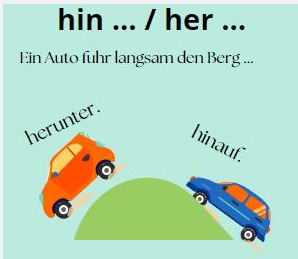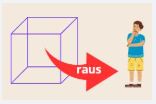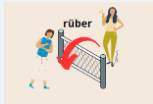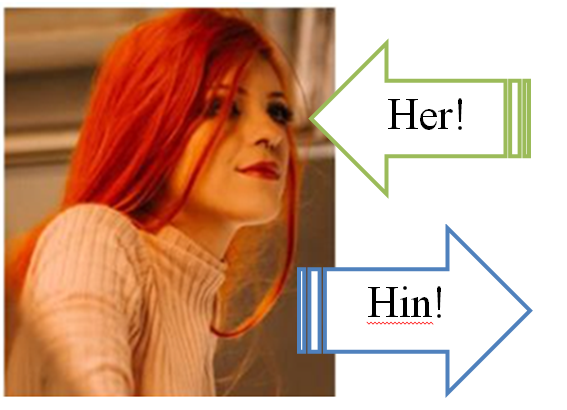In this lesson, you will learn all about the adverbs hin and her. Another treat in the German language. Many will think: “Really”, “So how many more are there”. All kidding aside, these two articles deserve attention, and honestly, they’re easy to learn, you might even remember everything from just one reading of this lesson. So let’s get to know hin and her – and their differences and similarities.
Thank you for reading this post, don't forget to subscribe!CONTENT
What do hin and her mean?
Question words woher and wohin
Hin and her with adverbs
Hin and her with verbs
Hin and her prepositions and verbs
Abbreviated forms with r- + preposition
What do raus, rein, rauf, runter and rüber mean?
What do hin and her mean?
Hin and her always describe movement.
Hin means movement from the speaker in any direction.
Her means moving towards the speaker from any direction
Click on:
Grammar Contents
Question words Woher? and Wohin?
The interrogative word wo expresses silence in German and in our language means: where. But if we add hin or her, we get two new interrogative words, wohin and woher, which express movement. Wohin means where and woher from where.
We must point out the difference between wo and wohin because that difference in the German language is important, it is strictly respected. When we ask with wo, we are necessarily asking about rest, so rest verbs are also included.
For example:
Wo wohnen Sie? – Where do you live?
Wo arbeiten Sie? – Where do you work?
Wo bist du? – Where are you?
If we ask a question with wohin, then we certainly ask for direction, and we use verbs of movement.
For example:
Wohin gehst du? – Where are you going?
Wohin fahren Sie? – Where are you traveling to?
I deliberately used the interrogative word where to in the translation, because in our spoken language this word is almost never used, but if someone uses it, we all know what it means, even though we all use the interrogative word where for both rest and movement, although we should movement, we use the word where to. That would be grammatically correct.
Wo? = rest
Wo bist du? In der Schule
Wohin? = directon (away from the speaker)
Wohin gehst du? In die Schule
Woher? = direction (to the speaker from anywhere)
Woher kommst du? Aus der Schule
Hin and Her with Adverbs
We combine hin and her, actually, with adverbs of place, and they necessarily indicate the direction from the speaker or towards the speaker.
For example:
dorthin (there, there), dorther (there), hierher (here), hierhin (there), dahin (to there, there), daher (to here, from there)Don’t forget that, because of hin and her, these are adverbs indicating direction.
For example:
Sie sind schon auf dem Weg hierher. – They are on their way here.
Sollen wir hierhin gehen oder dorthin? – Let’s go here or there?
Wie komme ich dorthin? – How do I get there?
Wie lange brauchen wir bis dahin? –How long does it take us to get there?
Hin and Her with Verbs
Hin and her are often used with verbs as separable prefixes. A can be combined with all verbs of motion. So then we indicate the appropriate direction of movement.
For example:
hingehen: Wirst du auch hingehen?
herkommen: Wo kommt denn so viel Geld her?
Hin and Her Prepositions and Verbs
In order to specify the direction even more precisely, they are often combined with prepositions. Since hin and her describe the direction of movement, they are combined with verbs whose meaning also has to do with movement.
For example:
fahren: hinfahren, hineinfahren, hinunterfahren, hinausfahren, herausfahren, ..
gehen: hingehen, hineingehen, hinuntergehen, hinausgehen, heraufgehen, heruntergehen, ..
kommen: herkommen, hereinkommen, herunterkommen, hereinkommen, herauskommen ..
Examples with sentences:
Wollen wir ins Haus hineingehen?
Der Zug fährt aus dem Bahnhof heraus.
Die neuen Jacken kommen nächste Woche herein.

Adverbial forms with r- + Preposition
In the spoken language, this type of verb is often shortened so that only the letter r + preposition remains. Here’s an overview of all the abbreviated forms:
hinaus / heraus = raus
hinein / heraus = rein
hinauf / herauf = rauf
hinunter / herunter = runter
hinüber / herüber = rüber
Click on:
Grammar Contents
What do raus, rein, rauf, runter and rüber mean?
raus = hinaus / heraus
For example:

Ich gehe (aus dem Haus) raus.
Also: rauslaufen, rauskommen, rausfahren, rausrennen, rausschwimmen, raustragen, rausschauen …
Raus acts as a separable prefix and has the meaning: outside.
rein = hinein / herein
For example:

Ich gehe (in das Haus) rein.
Also: reinlaufen, reinkommen, reinfahren, reinrennen, reintragen, reinschauen, …
Rein acts as a separable prefix and has the meaning: inside.
rauf = hinauf / herauf
For example:

Ich gehe auf den Berg rauf.
Also: rauflaufen, raufkommen, rauffahren, raufrennen, rauftragen, raufklettern, raufbringen …
Rauf acts as a separable prefix and has the meaning: above.
runter = hinunter / herunter
For example:

Ich gehe in den Keller runter.
Also: runterlaufen, runterkommen, runterfahren, runterrennen, runtertragen, …
Runter acts as a separable prefix and has the meaning: below.
rüber = hinüber / herüber
For example:

Ich klettere am besten dort über den Zaun rüber.
Also: rüberlaufen, rüberkommen, rüberfahren, rübertragen, rüberbringen, …
Rüber acts as a separable prefix and has the meaning: across, to cross from one side to the other.
See more:


